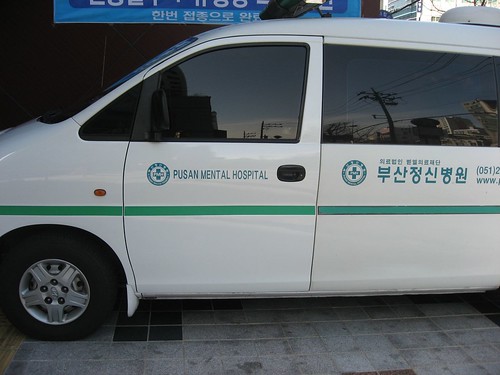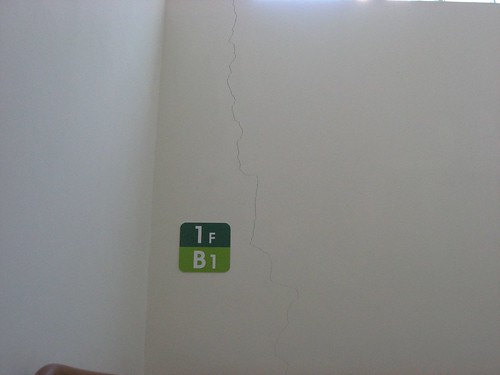When you reach a certain age the Korean Government start to write to you inviting you into a hospital of your choice for an annual medical, which helpfully serves as a reminder that you might have more years behind you than ahead. Generally, it seems like a good thing, because in England people are encouraged to get sick or die before visiting a medical professional; the public health service long since discovered that the longer it can avoid treating sick people, the greater the chance of them expiring before expensive drugs and care need to be employed. In Korea, the Government seems to want to prevent you getting seriously ill in the first place, and I'm sure the private health insurance industry here is grateful for that.
The trip to the hospital got off to a worrying start after discovering an ambulance parked at the entrance bearing the legend “Pusan Mental Hospital”. Just the day before, I'd read about a new law that allegedly enabled the Government to detain foreigners without trial on mental health grounds, in an article which ended with the words of a Korean wife saying "Now I can trick my non-Korean speaking husband into attending the hospital on some pretext, explain some of his habits to the doctors, and get rid of him." Worrying.
Given that the article is a satire, or at least I hope it is because the original news story leaves some room for doubt, I took this as proof that my life may now finally be approaching the point of maximum absurdity it's possible to reach as a private citizen without becoming a government employee. Five minutes later we were filling in the psyche questionnaire.
How many times a week do I get depressed? How many times a week am I sad? Why does the answer scale only go up to four? “Looks like you might be going to see a psychiatrist” quips my wife as she ticks several numerically high boxes. Thanks. Helpful. I don't know, isn't this normal for a foreigner living in Korea? Well, maybe it isn't, but I have no reference point. But I didn't get referred to a psychiatrist, so maybe it is. Or maybe they don't care, I certainly don't – that's the advantage of feeling down that all those happy people don't want to talk about.
So do I want to have a camera stuck down my throat? No... why would I? Honestly, I know network television in South Korea is so apparently awful that even the North Koreans find it stereotypical these days, but what lengths will medical staff go to just to entertain themselves in front of a TV? The procedure requires me to be heavily sedated or unconscious anyway, and I weigh up the obvious advantages of this versus the inherent risks and decide against it. I'll do it when I actually think I have a problem I thought, slipping into exactly the kind of sociological conditioning the British National Health Service works so hard to cultivate. “Yes,” says the nurse detecting my internal dialogue, “I can see that while you're physically ready for it, you're not mentally ready for it”. I don't even know what that means. What does that mean?
Now comes the really hard sell. So my blood is going be tested for thirteen different problems. Would I like to pay extra and be tested for seventy problems instead? It's only 30,000 won extra. This is how it begins. You can even pay extra to receive a forecast for future medical problems based on a range of additional tests, questionnaires and the hospital computer's random number generator. Or you can visit a fortune teller, because it might be cheaper. Buy into enough extra tests and the one problem they are guaranteed to detect is that you are haemorrhaging money. But I paid for the extra blood tests, because I'm intrigued to know the answer to test number 67 – 'percentage of banana concentrate in blood'.
An x-ray to top-up my Korean half-life, an ultrasound to see if I'm still generally sound, an ECG to test my short-circuits, and we're done. As we walk up the stairs from the dungeon of devices, I reflect on the fact that I'm clearly in much better shape than the hospital building, which is six months old and features an alarmingly large crack running down its side.
When we leave they forget to ask us to pay, resulting in two nurses chasing after us outside the building. Perhaps their unwillingness to wait a few days for my return appointment may not bode well for the test results after all.


No comments:
Post a Comment